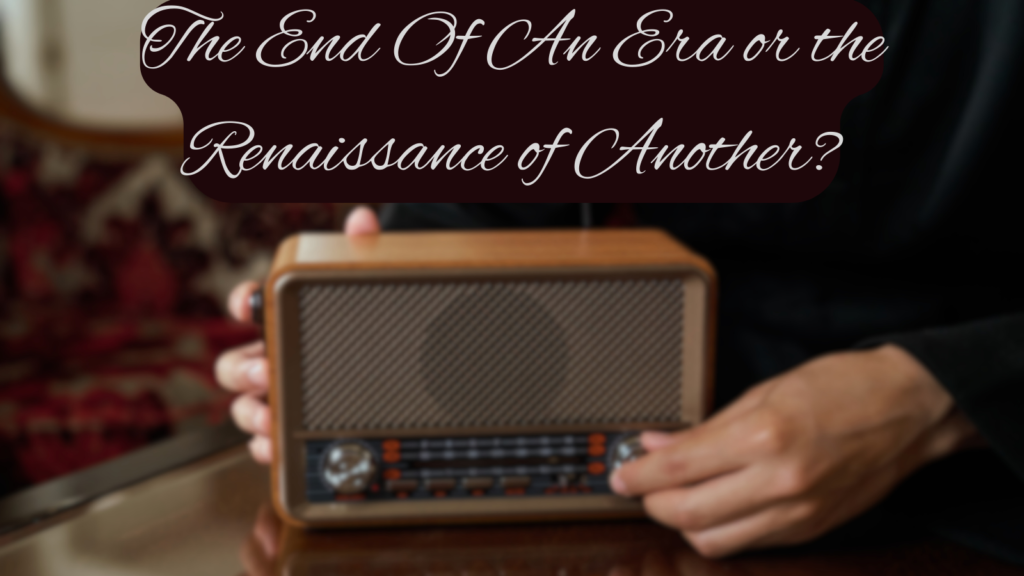
“The End of an Era: Reflecting on the Closure of Local BBC Radio and the Analogue Renaissance”

While listening to BBC Radio 4 this evening, I couldn’t help but feel saddened as I heard the voices of local BBC Radio hosts bidding farewell for the last time. It was disheartening to learn that the radio station they had dedicated themselves to, some for as long as 40 years, was shutting down. The program they hosted was exceptional, and their presentation was top-notch. I must commend the BBC for acknowledging this unfortunate reality, as other networks might simply ignore it and claim that radio is thriving more than ever.
During the program, they featured voice notes from loyal elderly listeners who, without computers, internet, or smart devices, relied solely on their trusty radios to receive news, information, companionship, and the music they had grown accustomed to. It was truly heartbreaking to hear their stories. Personally, I have always had a deep passion for radio. It has been a significant part of my life since childhood, passed down to me from my parents and grandparents.
Recently, I have been tuning in to Manx Radio, which broadcasts from the Isle of Man. Did you know it will celebrate its 60th anniversary next year and is still going strong, proudly providing unique local programming and remarkable presentation? From Mark Tyley in the morning to Christy in the Afternoon, Chris Kinley in the evenings, and the other outstanding shows they air, it’s a breath of fresh air. I listen to it on AM in Ireland, and it never fails to impress me. However, last weekend, they did something extraordinary—they handed over their frequency to Radio Caroline North for the weekend, as it dropped its anchor off the Essex Coast. Radio Caroline North is another fantastic station with exceptional presentation and a nostalgic music selection. It was an absolute joy to listen to and made me wish I had experienced the ’60s firsthand. Those born around 1945 were truly fortunate to have witnessed the best of all the decades!
Recently, I had a conversation with my own mother, who was born in 1944, and she expressed her frustration at the lack of radio catering to her age group. She longed for fun music from her youth but felt bombarded with doom and gloom discussions. It seems that many radio stations focus their content and advertisements on younger demographics, neglecting the loyal older listeners. These listeners remain dedicated to radio alone; they don’t jump between streaming platforms because many of them don’t even own a streaming device or have internet access. I applaud stations like Radio Caroline North, Manx Radio, and Angel Radio for acknowledging these forgotten listeners instead of telling them to download an app to listen.
On a different note, I recently met a twenty-something individual who had just purchased a record player and a DVD player. We crossed paths while browsing through box sets and vinyl records at an HMV store. I was fascinated by their choice of entertainment and their enthusiasm for the analog experience. They spoke passionately about the tactile feel and distinct aroma of vinyl, the sound of the needle touching the record, and the unique audio quality that cannot be replicated by digital formats. They emphasized the satisfaction of owning something physical, unlike an MP3 or MP4 file. To my surprise, they assured me that they were not alone in their appreciation for analog. This trend was apparently gaining traction, judging by the number of younger customers in the store. I found it all truly captivating!
It reminded me of a theory I had long held, the “Needle in a Haystack Effect” (N.I.A.H.E). It symbolises everyone desperately trying to stand out from the crowd, raising their hands, yet feeling invisible in a digital world with countless platforms and endless online destinations. The internet offers an overwhelming amount of streaming options, excessive variety, and the challenge of finding unique content amidst the noise. Perhaps there is indeed such a thing as “less is more,” and we might reach a point where we yearn for simplicity. Could we see a resurgence in analogue items, like rotary phones or a renewed appreciation for handwriting? Only time will tell, but for now, we should acknowledge and support those who still depend on analogue and do not live in the digital realm.
By Tracey